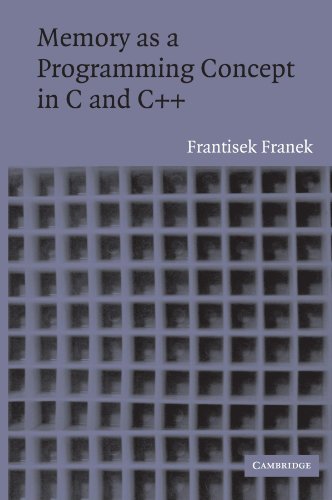Memory as a Programming Concept in C and C++ epub
Par fisher craig le mercredi, novembre 30 2016, 06:31 - Lien permanent
Memory as a Programming Concept in C and C++. Frantisek Franek

Memory.as.a.Programming.Concept.in.C.and.C..pdf
ISBN: 0521520436,9780521520430 | 272 pages | 7 Mb

Memory as a Programming Concept in C and C++ Frantisek Franek
Publisher: Cambridge University Press
Operations also have other options for the ordering requirements. Frantisek Franek, «Memory as a Programming Concept in C and C++» Publisher: Cambridge University Press | November 2003 | ISBN: 052181720X | Pages:272 | Format: CHM | Size: 3 MB. In this article, based on chapter 5 of C++ Concurrency in Action, author Anthony Williams discusses the memory-ordering tags used for atomic operations and how they relate to the synchronizes-with relation. C++ Primer Plus is a carefully crafted, complete tutorial on one of the most significant and widely used programming languages today. I would love to see some presentation or article /blog post/write up on shared memory programming in C++(boost, poco or whatever else). Josuttis * C++ Common Knowledge - Essential Intermediate Programming - Stephen C. Despite being a fairly low-level high-level language, it was designed to encourage machine and platform independent programming. Achingly, heartbreakingly clear, because some hardware incents you to pull out the big guns to achieve top performance, and C++ programmers just are so addicted to full performance that they'll reach for the big red levers with the flashing The facts: The C++11 memory model and what it requires you to do to make sure your code is correct and stays correct. First, never forget to allocate and dealloctae memory using a wild abandon, this is because they could easily splinter the virtual Written for the beginning game developer or programmer, the book assumes no previous programming experience and each new skill and concept is taught using simple language and step-by-step instructions. It is quite important even so, for the programmer to ensure that certain aspects are in place before using in establishing array C. I'd loved to have had this available ten years ago when I was first blundering through these concepts. Dynamic memory allocation is a common feature of programming languages (or libraries, such as in C/C++[3]) that allow allocation of varying sized pieces of data at run-time. The C++ Standard Library - A Tutorial and Reference - Nicolai M. This is different from the stack, as stack allocations are based on a first -in-last-out concept, such that when returning from a function data can be lost unless explicitly posted to a common “return” point. Richie's primary goals were to produce a minimalistic language that was easy to compile, allowed efficient access to memory, produced efficient code, and did not need extensive run-time support. Sun May 05, 10:31:00 PM PDT · Post a Comment · Older Post Home.